Posted March 13, 2019 by Nicky in Reviews / 2 Comments
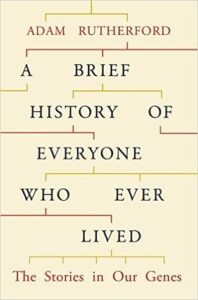 A Brief History of Everyone Who Ever Lived, Adam Rutherford
A Brief History of Everyone Who Ever Lived, Adam Rutherford
It’s an ambitious title, and it should come as no surprise that that’s not really a history of everyone who ever lived. It’s really a story about some of the things we know from our genes, and it’s a bit of a random sampling at that, covering ear wax (those who have studied genetics will find this no-shocker, since wet vs sticky earwax is a fairly common example of a certain kind of genetic trait), kings, disease, migration, redheads, and all kinds of things in between. To me, it read like a grab bag of interesting facts we know about genetics: yes, the facts are interesting, but a coherent argument leading through a book it is not.
Rutherford’s not a bad writer, and he clearly has an eye for a good story, but… first of all, this level of pop-science is a bit too pop for me now, and secondly, it’s a disorganised mess.
Rating: 3/5
Tags: book reviews, books, non-fiction, science
Posted March 10, 2019 by Nicky in Reviews / 0 Comments
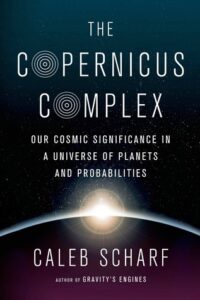 The Copernicus Complex, Caleb Scharf
The Copernicus Complex, Caleb Scharf
Ostensibly, this book is about a simple question: are humans alone in the universe? It has to go the long way around to come to any answers, exploring other arguments by way of figuring out whether the Earth is or isn’t rare in the universe and whether or not life is as tightly constrained as some people say, but the core principle of the book is that we need to find a middle ground between the current main ideas — the Copernican view that we can’t be unique, and the Rare Earth view that says life in the universe must be unusual.
Mostly, my wife got to watch me mutter “yes, obviously”, and I’m tempted to quote Lord Peter on Chief Inspector Parker here — it takes Scharf a desperately long time to someone who already has a somewhat formed opinion to “crawl distantly within sight of a conclusion”. That conclusion, in the end, is basically where I stand: not enough data, come back later (with a side of Scharf being pretty sure that neither extreme is going to turn out to be correct, with which I disagree — I think it’s all up for grabs at this point).
So anyway, if you want to know why I came to the conclusion I’ve written in my science blog recently (i.e. “we don’t know and we can’t know based on the current data we have”), this book has a good roundup of the evidence. Scharf isn’t bad at explaining it.
But if you’re looking for answers, I find it as unconvincing as all the other attempts at answering this question.
Rating: 3/5
Tags: book reviews, books, non-fiction, science
Posted March 6, 2019 by Nicky in Reviews / 0 Comments
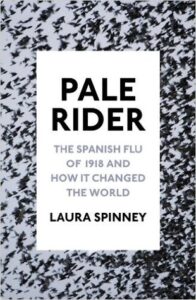 Pale Rider, Laura Spinney
Pale Rider, Laura Spinney
Pale Rider is about the 1918 flu pandemic known as “Spanish flu”: the fact that it killed many more people than the Great War did is a well-known fact now, and this particular pandemic is credited with making scientists realise the dangers of a global health crisis like this — and the likelihood that it could and would happen again.
I’ll confess, I didn’t think I’d learn that much about the flu from reading this book, having already read John M. Barry’s The Great Influenza, but in fact there was a lot here that was new to me. Not so much in understanding the disease itself — if Barry’s book didn’t do that, studying for my exams certainly did — but in understanding the impact it had on the world, and particularly on non-Western countries. There’s a lot here that’s new to me about China and Russia, for instance, whereas I feel like The Great Influenza focused much more on the American side of things.
There’s also, I feel, more of an attempt to understand the social and political effects of the pandemic, rather than just the medical and scientific.
However, my end feeling is the same: influenza is a fascinating topic, and if it doesn’t scare you (in a measured informed way that leads to taking sensible precautions like getting the flu vaccine every year), it should. Spinney has a common-sense approach to it all — there’s a lot of things that need to align to make a pandemic, and Spinney doesn’t overstate the likelihood of that happening, but she does lay out the risks and emphasise the need for data collection and disease surveillance. Hear hear!
Rating: 4/5
Tags: book reviews, books, history, non-fiction, science
Posted February 8, 2019 by Nicky in Reviews / 0 Comments
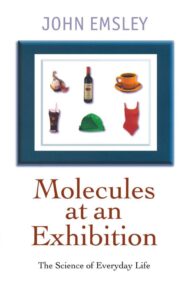 Molecules at an Exhibition, John Emsley
Molecules at an Exhibition, John Emsley
This started out fascinating, but started to wear on me. Basically, it’s a ‘gallery’ of various molecules that are important in one way or another to human life. There are nutrients we require, poisons that kill us, fuels we use, things that make useful objects, etc, etc. It’s possibly better just being dipped into than read cover to cover; I certainly got tired of all the fuels and the relatively similar titbits about some of the elements. It’s not bad, but it didn’t keep me very interested either.
I’m hoping his book specifically on poisons is more up my street…
Rating: 3/5
Tags: book reviews, books, non-fiction, science
Posted January 21, 2019 by Nicky in Reviews / 3 Comments
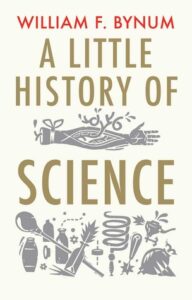 A Little History of Science, W.F. Bynum
A Little History of Science, W.F. Bynum
If you don’t actually know much about the history of science, this book might well be for you; for me, it was painfully obvious, hitting exactly the topics I expected, skimming over what I expected it to skim. A worse crime, however, is that the author simply wasn’t accurate: if you’re going to write a non-fiction book, it’s important to make sure you don’t speak beyond your research.
It does not take much research to find out that Egyptian hieroglyphs and Chinese characters are not pictographic representations of language. (To be perfectly accurate, some of the characters echo in form the thing they name; a cow head shape might mean the word cow, for instance. However, the languages also contain phonetic characters.)
I didn’t read beyond that. On that point, I knew the author was wrong — on a subject that isn’t even a particular area of expertise for me; how, therefore, could I trust him to have done his research about anything else? If we’re talking deeply technical details, that’s different, but it is widely understood that Egyptian hieroglyphs and Chinese characters are not solely logographic. There’s too little time for something where I distrust the research and editing and I’m bored.
Rating: 1/5
Tags: book reviews, books, history, non-fiction, science
Posted January 17, 2019 by Nicky in Reviews / 0 Comments
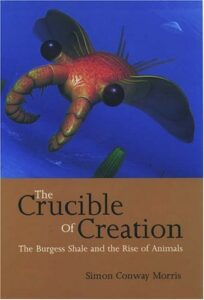 The Crucible of Creation, Simon Conway Morris
The Crucible of Creation, Simon Conway Morris
Part discussion of the Burgess Shale, part rebuttal of Stephen Jay Gould’s premises in Wonderful Life, this book was a bit of a slog to get through for me. It’s a topic I find fascinating, but something about the style mostly had me snoozing, even when he entertainingly decided to take a turn for the science fictional and imagine a whole dive into the seas at the time of the Cambrian explosion. (That bit was mostly entertaining through being surprising, though also through trying to bring to life the animals that could’ve been seen if that could happen, and how they would have behaved — the most speculative bit of the book, basically.)
I feel like Wonderful Life is probably the more fun to read and the more comprehensive, but it’s still fascinating to read about the point of view of a scientist who has actually worked with the Burgess Shale. Whatever you think of Conway Morris’ style, he’s a scientist Gould respected and an expert in his field.
Rating: 3/5
Tags: book reviews, books, non-fiction, science
Posted October 15, 2018 by Nicky in Reviews / 0 Comments
 Endless Forms Most Beautiful, Sean Carroll
Endless Forms Most Beautiful, Sean Carroll
At this point, I must admit I’m a bad judge of pop-science when it covers biology. To me this is a very easy read now, covering simple topics, but I know I wouldn’t have felt that way a couple of years ago. If you’re interested in evolutionary biology, though, this is a very good primer on the science of Evo Devo: understanding evolutionary relationships through understanding the development of embryos, how certain genes work in causing large morphological differences even though almost the same gene can be found in a wildly different species.
I think if you have a reasonable understanding of genetics and how proteins are made, you should be okay here: it’s not requiring expertise, though it may take concentration to follow some of the reasoning if you’re not already familiar. If you are, it illustrates the principles nicely, and I imagine a full colour copy of the book (if it exists) would be rather physically gorgeous as well. There’s a lot of black-and-white images of butterfly wings, for instance, in my particular edition. The points could probably have been more clearly demonstrated with colour images where the differences are easier to highlight…
All the same, a fascinating book, whether you’re an expert or not (I think). Evo Devo is a bit of a buzzword for some biologists lately, and this book is worth the read for learning about that. I wish I’d read it before the module I did that included some of this stuff: it would have definitely made the learning part come easier!
Rating: 4/5
Tags: book reviews, books, non-fiction, science
Posted October 9, 2018 by Nicky in Reviews / 2 Comments
 Poison: A Social History, Joel Levy
Poison: A Social History, Joel Levy
I’ve been joking that my wife should be worried I picked this up, but really I was here to understand how poisons work. Although the ‘social history’ part of the title is definitely true, describing famous historical poisoning cases, it also includes little profiles on each poison which explain how it has the effects it has in chemical terms. I already knew some of the most notorious ones (partially because of the excellent book on Agatha Christie’s use of poisons, A is for Arsenic), but there were others I didn’t know.
Overall, it’s a bit shallow, focusing on some of the most sensational cases of poisoning and basically whipping around the types of poison that’re out there and how they’ve been used for suicide, assassination, etc. Still, it had its interesting points, and if you’re interested in true crime there’s a couple of cases I knew nothing about.
Not something to rush out and get, in my opinion, and while spouses should maybe be worried it’d put ideas into someone’s head, there’s no practical information about obtaining poisons or anything dangerous like that! It really is much more about the history, with explanations of how poisons actually do their damage.
Rating: 2/5
Tags: book reviews, books, history, non-fiction, science
Posted October 5, 2018 by Nicky in Reviews / 2 Comments
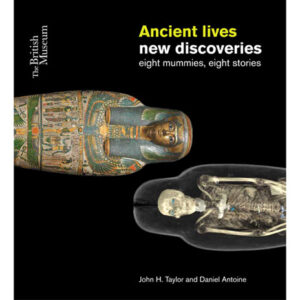 Ancient Lives, New Discoveries, John H. Taylor, Daniel Antoine
Ancient Lives, New Discoveries, John H. Taylor, Daniel Antoine
Ancient Lives, New Discoveries is a fascinating volume which peers beneath the wrappings of eight mummies in the British Museum’s collection, using state of the art CT scanning and reconstruction to do so completely non-destructively. The mummies are from different areas of Egypt, and different eras as well, from mummies preserved naturally through to mummies prepared using every trick of the embalmers’ trade. There are amazing images in this book, with various different views of each mummy, and additional notes explaining significant features (like poles used to stabilise detached heads, an odd metal(?) ring somewhere in the oldest mummy’s abdomen, etc. There’s also some background information of a fairly basic sort, if you already know a fair bit about Egypt — if you don’t, this volume gets you up to speed enough to understand the mummies, in relatively few pages.
One quibble I had was the constant insistence that male bodies in sarcophagi with female names were definitely put there by accident (either in antiquity or now). I’ll admit I don’t know anything about gender in Ancient Egypt, but gender has always been fluid and expressed in different ways in different societies. Probably some of the bodies are in the wrong sarcophagi, owing to the way their tombs were pillaged and the way collections were swapped about with little attention paid to provenance. But… just maybe some of the ambiguities might be best resolved by thinking about whether we’re looking at gender the same way. Clearly the wrapping and presentation of mummies reflected social roles as much as anything else, as demonstrated by the young girl identified as a temple singer, mummified and presented as a desirable young woman — the intent does not seem to have been to reflect a person accurately, at any rate. Who says they weren’t wrapped and presented in a way meant to represent who they were in life, rather than the bare details biology gives us?
I know I’m not an expert in that field, but I can’t help but think that some acknowledgement of that as a possibility would have fit in well. Instead, it felt as if everything was explained away as a mistake on someone else’s part, rather than a potential misunderstanding on the part of those investigating the mummies now.
Still a fascinating book, though; perfect for someone fascinated by mummies.
Rating: 4/5
Tags: book reviews, books, history, non-fiction, science
Posted October 2, 2018 by Nicky in Reviews / 4 Comments
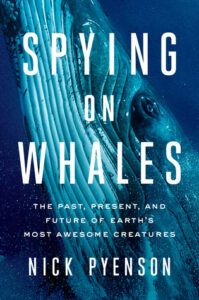 Spying On Whales, Nick Pyenson
Spying On Whales, Nick Pyenson
Pyenson is clearly obsessed with whales — with the idea of them, with studying them, with understanding them and sharing that understanding. In this volume, he does his best to share all those things: his enthusiasm for whales as much as his academic interest, his wonder at them as much as his understanding of them as part of their environment. He tours through whales of the past through their fossils (so if you’re a palaeontology nut, this one’s for you too!), whales of the present through observation and dissection (so if you’re into biology…) and whales of the future through trying to understand how they impact their environment, and what the seas might be like without them.
It’s a fascinating journey: whales aren’t one of the topics I read about obsessively, but I wasn’t going to pass up a book about them from the library, either. Pyenson’s style is breezy, and he manages to communicate wonder even about things that might sound kind of gross (like whale dissection). To my surprise, I think I was most fascinated by his chapter about the weird new sense organ he discovered in whales’ chins, via actually being there on a whaling station to see freshly killed whales being butchered. (He has mixed feelings about this, but correctly notes that sometimes, you have to use the opportunities you get.)
I’m not raring to go dashing off to become an expert in matters marine, which is the sign of a non-fiction book that really gets to me, but nonetheless there’s plenty of interest here for the armchair enthusiast. If the idea of these massive mammals takes your breath away a little bit, this book might just augment that.
Rating: 3/5
Tags: book reviews, books, non-fiction, science
 A Brief History of Everyone Who Ever Lived, Adam Rutherford
A Brief History of Everyone Who Ever Lived, Adam Rutherford








